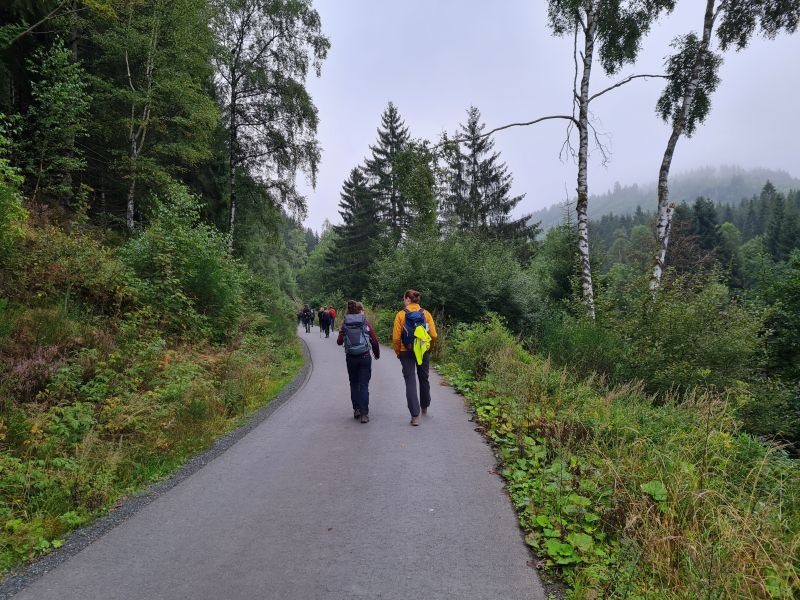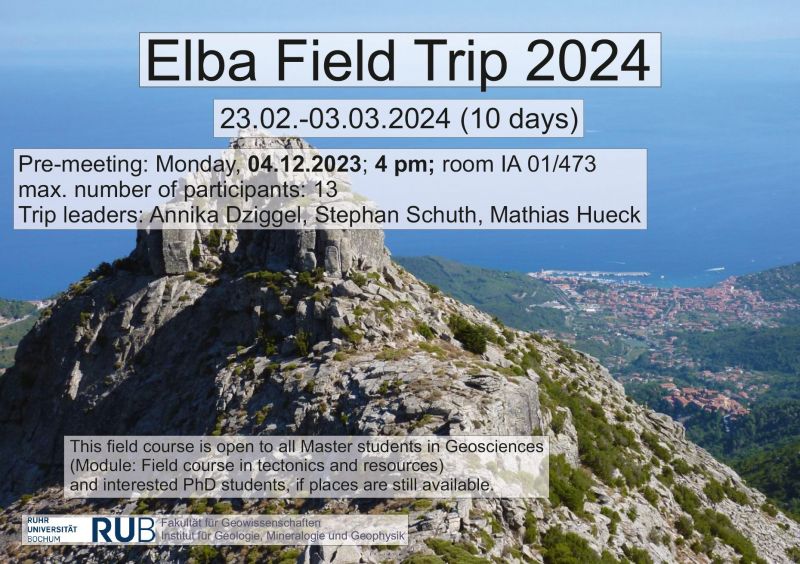
Teaching
BSc studies
Field excercise to endogeneous and exogeneous processes (Module no. 4: Basics of Geosciences)
Lecturers: N.N.
The field exercise is intended to familiarize students with the basic working methods of geosciences in the field. This includes the use of the geological compass, magnifying glass, rock description and the creation of sketches of outcrops.
Students learn to interpret what they observe and draw conclusions about the geological processes that have taken place.
The field exercise deals with various topics on exogenous and endogenous processes. For this purpose, outcrops of the Upper Carboniferous along Lake Baldeney and a quarry of the now largely dismantled Kunkskopf volcano in the Eifel are visited over two days. The students then learn how to write short field trip reports.
It is recommended that students attend this course in the second BSc semester, as it teaches the basics for field trips in later semesters.
Field excercises: methods - Tectonics, Coal and Mining (Module no. 8: Methods of field work)
Lecturers: Dr. S. Schuth
The field exercise "Tectonics" deals with the investigation and interpretation of stratifications, fissures, folds and faults. Students will learn how to use a geological compass and how to evaluate and interpret the data obtained in a regional geological context. This two-day field exercise visits various outcrops in the Harz Mountains. It is combined in terms of time and topic with the Harz excursion on "Regional Geology and Resources", so that students spend four field days in the Harz (2 days of field methods, 2 days of regional geology and resources) and can make better use of their time in the Harz.
The field exercise "Coal and Mining" focuses on the processes of coal formation, the transformation of the Ruhr area through progressive coal mining and technical development as well as the consequences of mining in the Ruhr area. Students are expected to work independently on the processes of coal formation on the basis of outcrops and to create profiles with the help of field investigations in order to determine the expected position of a coal seam on the ground surface. The two-day field exercise visits various outcrops in the Ruhr area as well as the former Nachtigall colliery in Witten.
Field excercise Regional Geology (Harz) (Module no. 7: Resources and regional geology)
Lecturers: Prof. A. Dziggel, Dr. S. Schuth, Dr. M. Hueck
This field exercise deals with the geological development of the Harz Mountains from the Devonian to the Permian. The most important rock types and geological events are presented: Depositional environments of Devonian and Carboniferous sediments and volcanic rocks, Variscan mountain building, intrusion of Brocken granite and basic and ultrabasic rocks, and the transgression of the Zechstein Sea.
Note: The field exercise Methods "Tectonics" (see module "Field Exercises: Methods") visits various outcrops in the Harz Mountains. It is combined in terms of time and topic with the Harz excursion on "Regional Geology and Resources", so that students spend four field days in the Harz (2 days of field methods, 2 days of regional geology and resources) and can make better use of their time in the Harz.
Geological maps and profiles (Module no. 8: Methods of field work)
Lecturer: Dr. S. Schuth
The lecture introduces students to the use and interpretation of geological maps. Students learn how to create profiles and develop a three-dimensional geological image from two-dimensional information and derive the temporal development of an area from this. In addition, the use of the geological compass is taught and the evaluation methods of the data obtained with it are presented.
Successful completion of a written exam is required prior to participation in Mapping Course 1.
Mapping Course 1 (Module no. 8: Methods of field work)
Lecturers: Prof. A. Dziggel, Dr. S. Schuth, Dr. M. Hueck
In this module, students learn how to map an area geologically and construct geological profiles. This includes determining the position in the field, recognizing and determining the location of layers and faults, displaying the findings on a geological map and recording stratigraphic profiles.
Resources and regional geology (Module no. 7: Resources and regional geology)
Lecturer: Prof. A. Dziggel
This lecture introduces students to the basics of mineral deposits and regional geology. The regional distribution, economic importance and production of raw materials in Germany are explained on the basis of the geological development of Central Europe in different geological eras. The most important ore minerals and structures as well as the use of metallic and non-metallic raw materials are presented.
MSc studies
Field course (Module Field course in Tectonics and Resources) 2024: Elba
Dozenten: Prof. A. Dziggel, Dr. M. Hueck, Dr. S. Schuth
The field course in 2024 is investigating the very diverse geology of the beautiful island of Elba. The field course takes place from 23 February to 03 March 2024 (10 days). The aim of this field course is to train the student's field skills in tectonics and economic geology, and to combine theoretical knowledge with field observations. The field course may include small mapping projects and visits to open pit mines. The course is open to all students with a BSc degree.
For more informations please contact Prof. Dziggel or Dr. Hueck.

Pre-field course seminar (Module Field course in Tectonics and Resources)
Dozentin: Prof. A. Dziggel
In this seminar, the students prepare presentations on various topics that are covered in the field course on tectonics and resources.
Module: Geochemical analyses by Laser Ablation-ICP-Mass Spectrometry
Dozent: Dr. S. Schuth
This course includes lectures about the principles of laser radiation, analytical approaches of laser-based analyes, interaction of the laser beam with solid matter and the combination of a laser ablation device with a mass spectrometer for major and trace element and isotope analyses. Principles of mass spectrometry including the use of plasma are presented in the lectures as well. The evaluation and interpretation of the obtained data prepares the students for the practical part of the course.
The second part of the course is a practical laboratory course where the students learn the basics to operate a laser ablation system that is coupled to a triple-quadrupole mass spectrometer with an inductively coupled plasma source. Different sample materials (crystals, glasses, alloys) are analysed, and the data are then evaluated for accuracy and precision.
Successful participation in the course "Analytical methods in rock analysis" is recommended, but not mandatory.
Metallic mineral deposits (Module Economic Geology II)
Dozentin: Prof. A. Dziggel
This course introduces the students to ore forming processes, genetic concepts and classifications of metallic mineral deposits. Conceptual difference between mineral resources and ore reserves and economic aspects are also covered. Magmatic(-hydrothermal) ore forming systems include ortho-magmatic deposits, deposits related to granites, Cu-porphyries, ore deposits in mid-ocean ridges and ophiolites. Hydrothermal ore-forming systems related to metamorphic processes as well as ore deposits in supergene and sedimentary settings are also discussed.
Non-metallic mineral deposits (Module Economic Geology II)
Dozentin: Prof. A. Dziggel
This course introduces the students into the formation of non-metallic mineral deposits, the use and properties of industrial minerals, earths and rocks, salt and gemstones (diamond only).
Research project on ore deposits (Module Economic Geology II)
Dozentin: Prof. A. Dziggel
This course encompasses the guided independent study of well-characterized hydrothermal ore deposits using hand specimens, thin- and polished sections and a range of whole rock and mineral-chemical data. This course introduces students to research-oriented learning and is aimed at preparing the students for their Master projects.
THERMOCALC course (Module Metamorphic Petrology)
Dozenten: Prof. A. Dziggel
In this course, the students learn how to construct pseudosections for complex model systems involving solid solutions, based on case studies in metabasic rocks.
Bachelor- und Master-Arbeiten
Master-Arbeit „Vanadium als Rohstoff – Mineralogie und Vanadiumkonzentrationen in repräsentativen Vorkommen in Kanada“
Master-Arbeit zum Thema „Vanadium as a resource – mineralogy and vanadium concentrations in representative deposits in Canada“
Hintergrund - Das Spurenelement Vanadium (V) ist in industriellen Fertigungsprozessen und Alltagsanwendungen weit verbreitet. So wird es beispielsweise bei der Herstellung von Stahl mit einer besonders hohen Härte und hochfesten Metallstrukturen als Veredler für Stahllegierungen eingesetzt. In der chemischen Industrie dient V als Katalysator zur Herstellung von Schwefelsäure, einem wichtigen Reagenz in zahlreichen chemischen Herstellungsverfahren. Im Alltag wird V in Metallwerkzeugen eingesetzt, um deren Härte zu erhöhen. Vanadium ist auch von besonderer Bedeutung für den Übergang zu grüner Energie als alternativer Speicher für elektrische Energie in Form von V-Redox-Flow-Batterien.
Die wichtigsten Exporteure von V-Erzen sind derzeit China, Russland, Südafrika und Brasilien, aber auch andere Länder haben begonnen, ihre Explorationsaktivitäten zu erweitern. Kanada beispielsweise verfügt über eine leistungsfähige Bergbauindustrie und zahlreiche V-Vorkommen, die jedoch derzeit nur in vergleichsweise geringem Umfang abgebaut oder erkundet werden. Aufgrund seiner chemischen Eigenschaften tritt V als Spurenelement in Sedimenten, z. B. in Schwarzschiefern, sedimentär-exhalativen (SEDEX) Lagerstätten, in Magmatiten (z. B. Fe-Ti-V-Magnetite) sowie in Bitumen und Ölsanden in Gehalten von mehreren Promille auf und wird in derartigen Vorkommen z.T. abgebaut.
Arbeiten - Im Rahmen der Master-Arbeit sollen mehrere bekannte Vanadium-Vorkommen in Québec und Yukon (Kanada) untersucht und beprobt werden. Hierzu ist eine ca. dreiwöchige Probennahme im Sommer 2023 und 2024 zusammen mit Kooperationspartnern der University of Toronto (Kanada) geplant. Aus den gewonnenen Proben werden an der RUB Dick- und Dünnschliffe erstellt. Nach eingehender mikroskopischer Untersuchung der Schliffe erfolgt eine weitere Untersuchung mittels Mikrosonden-Analytik ebenfalls an der RUB. Ein besonderes Augenmerk soll auf die Bestimmung der mineralogischen Verteilung des Vanadiums in den Proben gelegt werden. Die Analysen hierzu werden im neuen Laser-Ablation-ICP-Massenspektrometrie-Labor der Arbeitsgruppe Tektonik & Rohstoffe durchgeführt.
Fragestellungen
- Welche Unterschiede im Mineralbestand der beprobten Vanadiumvorkommen gibt es?
- Wie ist die Vanadiumkonzentration und -Verteilung in den Mineralphasen (z.B. auch Zonierungen, V-reiche Einschlüsse)?
- Wie können die Vanadium-Verteilung in und zwischen den Mineralphasen und mögliche Konzentrationsunterschiede zwischen den Probenlokalitäten erklärt werden? Welche Ursachen kommen für die Vanadiumanreicherung in den Vorkommen in Frage?
Anforderungen - Für die Bearbeitung der Master-Arbeit werden die Fähigkeit zur Arbeit im Gelände bei jedem Wetter, Interesse an der Arbeit im neuen LA-ICP-MS-Labor der Arbeitsgruppe Tektonik und Rohstoffe, und gute Englischkenntnisse erwartet. Außerdem sind Kenntnisse zu den Themen Rohstoffe und Geochemie und Mikroskopie-Erfahrung hilfreich.
Interessierte melden sich bitte bei Prof. Dziggel und Dr. Schuth (stephan.schuth@rub.de), Gebäude IA 4/185 bzw. IA 4/53.